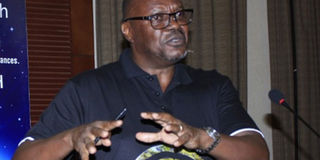World wildlife fund Partners with Velux Group to stop environment degradation

David Duli, WWF Uganda country director
The Velux Group is the latest Business to join WWF in a partnership aimed at stopping the degradation of the planet’s natural environment. The company will be supporting conservation projects in Western Uganda among other countries aimed at dramatically cutting the carbon emissions of its company and value chain in line with the Paris Agreement’s most ambitious 1.5°C reduction pathway.
Lifetime Carbon Neutral is a pioneering new commitment initiated by the Velux Group and developed together with WWF to take responsibility for both past and future carbon emissions. This innovative commitment will capture Velux historic carbon footprint and at the same time preserve invaluable natural forests and wildlife around the world for current and future generations.
David Briggs, the Chief Executive officer at Velux Group said, “The planet is facing a serious climate and nature crisis and this requires extraordinary action. According to our values as a company, we strive to do more than most, so that’s why we have developed Lifetime Carbon Neutral. It’s an innovative commitment involving a 20-year partnership with WWF to capture the equivalent of our historical carbon emissions by 2041. We will also dramatically reduce our future carbondioxide emissions and ask our suppliers to do the same. Hopefully, other companies will be inspired to become ‘Lifetime Carbon Neutral’ in order to create a sustainable future for all,
According to WWF Country Director, David Duli, the Velux Group will work with WWF to become Lifetime Carbon Neutral by investing in forest and biodiversity projects over the next 21 years.
He added that this will help halt habitat loss, deforestation and land degradation threatening the biodiversity of forest ecosystems in Uganda and the world at large, while working with and benefiting local communities.
He said in Uganda, the focus will be on restoring degraded forests, growing new forests, and protecting the remaining natural forests through a broad range of measures.
The project will also grow trees in woodlots, other agroforestry systems, and plantations outside protected areas to meet demand for various forest products and reduce pressure on natural forests.
According to WWF’s head of communications, Rita Kyategeka, almost all businesses rely on nature not just for resources such as meat, fish, timber, and fiber but also for services like crops pollination and clean water, as well as healthy customers and workforces.
“It’s for that reason that WWF under the Business for Nature initiative is rallying business to not only take action for nature but also influence nature biased decisions and transform the global economy,” she noted.
With the impacts of the climate and nature crises becoming increasingly clear, ambition and action is urgently needed to build a more resilient and sustainable future for all.
WWF is currently working with Businesses such as AbInBev (Nile Breweries) to restore the quality and quantity of water in River Rwizi. Other business on board include Hima cement, Responsibility, Absa Bank among others.
Senior Conservationist Alice Ruhweza says businesses have a critical role to play in limiting global warming to 1.5°C and reversing nature loss. According to climate science, to reach the 1.5°C target of the Paris Agreement and net-zero by 2050, emissions need to be cut by 50% in the next decade.
She added that the foundation of a corporate climate strategy is to have a Science-Based Target to cut its own emissions and then make investments that help reduce or remove emissions even further.




